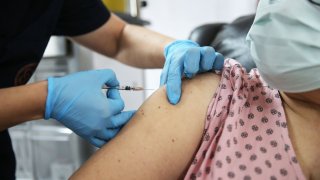
- Trial data from pharmaceutical giants Pfizer and Moderna shows that their respective vaccines are safe and highly effective at preventing Covid-19.
- More good news came Thursday as preliminary findings from a peer-reviewed phase two trial showed the vaccine from AstraZeneca and Oxford University is safe.
- Health and social-care workers should be first in line to get the vaccine, followed by people with health conditions that make them vulnerable to Covid-19, Dr. Hans Kluge said.
LONDON — News from global pharma firms that their coronavirus vaccine candidates are highly effective is welcome, but work needs to be done to ensure they reach everyone around the world, the World Health Organization's Europe chief said Thursday.
"I firmly believe that there is more hope ahead of us than despair behind us," Dr. Hans Kluge, WHO regional director for Europe, said in an online broadcast as he discussed the latest vaccine news. He added that it would not be a "silver bullet" as access to the vaccine would be limited at first.
The comments follow trial data from pharmaceutical giants Pfizer and Moderna, showing that their respective vaccines are safe and highly effective at preventing Covid-19.
More good news came Thursday as preliminary findings from a peer-reviewed phase two trial showed the vaccine from AstraZeneca and Oxford University is safe and triggers a similar immune response among all adults.
The news from Pfizer and Moderna prompted a huge sigh of relief from vaccine makers and global leaders, although regulators are yet to approve any of the vaccines, and logistical questions remain over the potential speed of mass production and distribution worldwide.
Kluge cautioned on Thursday that "any Covid vaccine should be a global, public good" with equal access for all.
Money Report
"In the last few days we have received good news with two particularly promising vaccines. However, this promise will never be realized unless we ensure that all countries have access to the vaccine market, that it is delivered equitably, that it is effectively deployed and that countries address pockets of vaccine hesitancy," he said.
Health and social-care workers should be first in line to get the vaccine, followed by people with health conditions that make them vulnerable to Covid, Kluge said. In the meantime, before a vaccine is widely available, he called on the public to maintain efforts like mask wearing and social distancing.
The WHO's comments come amid a mixed picture regarding the coronavirus worldwide. While much of Asia appears to be on top of the pandemic, cases and fatalities continue to rise in the Americas and Europe.
In the WHO's latest weekly update on Tuesday, the global health body warned that the rates of new Covid-19 cases and deaths continued to increase globally, with almost 4 million new cases and 60,000 new deaths recorded in the Nov. 9-15 period. The WHO's tally of global confirmed infections now stand at over 55.6 million, with the number of deaths around the world at 1,338,769.
There have been hopes in Europe that national or partial lockdowns, imposed since a second wave of infections emerged at the start of the fall, are starting to have a positive effect.
Parts of the U.S. are facing the prospect of more shutdowns, however. New York City announced Wednesday that it is closing schools due to a rising positivity rate, and other authorities are moving to reinstitute some of the stay-at-home orders, curfews and public safety measures, including shutting down nonessential businesses.
Fears are growing that if the infection spread is not contained, widespread lockdowns could be reinstated.






